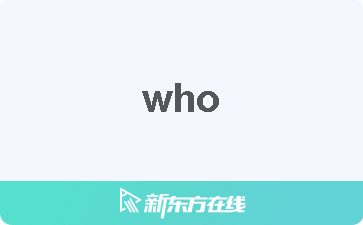who
[CONJ, PRON]

1. 谁(用于特别是动词和形容词之后,引导从句,说明人的身份)
You use who after certain words, especially verbs and adjectives, to introduce a clause where you talk about the identity of a person or a group of people.
双语例句
例:Police have not been able to find out who was responsible for the forgeries.
警察还未能发现谁是那些伪造案的元凶。
例:I went over to start up a conversation, asking her who she knew at the party.
我走过去和她攀谈,问她在聚会上都认识谁。
CONJ. 连词
1. …的人(用于关系从句句首,具体说明所谈论的人或给出更多相关信息)
You use who at the beginning of a relative clause when specifying the person or group of people you are talking about or when giving more information about them.
双语例句
例:There are those who eat out for a special occasion, or treat themselves.
有些人会在特殊的日子或犒劳自己时出去吃饭。
PRON. 代词
1. 谁(用于疑问句,询问姓名和身份)
You use who in questions when you ask about the name or identity of a person or group of people.
双语例句
例:Who's there?
那是谁?
例:Who is the least popular man around here?
谁是这里最不受欢迎的人?
例:'You reminded me of somebody.'—'Who?'
“你让我想起了一个人。” “谁?”
QUEST. 疑问词

关注新东方在线考雅课程中心
免费获取雅思备考资料包
雅思口语题库
扫码添加助教回复【口语题库】免费领取


 资料下载
资料下载
 公开课
公开课 编辑推荐
编辑推荐